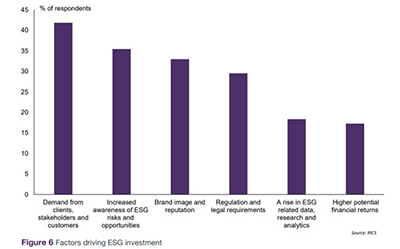
RICS: Owners Must Accelerate Decarbonization Effort to Support Net-Zero Goal

Commercial property owners are moving in the right direction but must move faster to decarbonize buildings, according to the Royal Institute of Chartered Surveyors and World Built Environment Forum.
The RICS World Built Environment Forum Sustainability Report found increased appetite for greener buildings and more sustainable projects, but not at a fast enough pace to reach global net-zero emissions targets.
“As countries strive to achieve net-zero, the rising awareness in how integral environmental, social and governance goals are to our future is coming through in our survey, as more occupiers and investors look for buildings that contribute to reducing their carbon footprint,” said Simon Rubinsohn, RICS Chief Economist. “The data also show the impact this demand is having on rents and lease terms, with encouraging statistics coming through about how green buildings are achieving higher returns.”
More than 40 percent of respondents identified client, stakeholder and customer demand as one of the main driving forces behind the environmental, social and governance investment boom. A majority of the 4,000-plus survey respondents pointed to increasing occupier and investor appetite for green and sustainable buildings in the past year, with only 6 percent of respondents reporting a fall in demand for such assets in spite of the challenges posed by COVID.
“As demand for greener assets grows, there seems to be some evidence to suggest that enhancing the sustainability attributes of a building can command a rent premium,” the report said. Half of the survey respondents said they believe “green” buildings can charge higher rents than non-green buildings. Many respondents said older buildings that are not considered green or sustainable receive a “brown discount” — lower rents to compensate for not being sustainable.
But more can be done, the report said. While 40 percent of respondents seeing more “green” leases–landlord and tenant arrangements that encourage or even contractually specify sustainability standards–most people said they have yet to see green leases become a dominant feature in their market.
Rubinsohn also noted real estate construction firms, who are at the forefront of dealing with some of the major consequences of climate change, believe more can be done to achieve net-zero. “It is clear from the feedback that respondents have a willingness to improve, but currently only a third of respondents are measuring their operational carbon output,” he said. “As material prices rise across the globe and building supplies become scarcer, firms are looking for new solutions that will help make a measurable impact when it comes to tackling climate change.”
